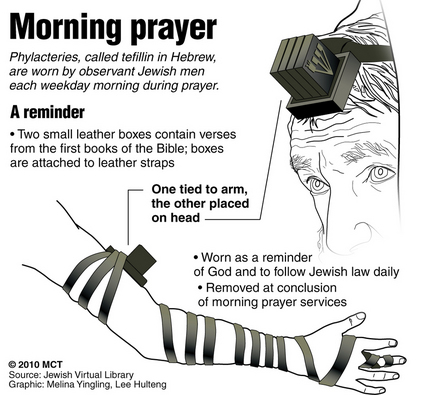Sunday Lectionary: Power and Responsibility
Thirty-First Sunday in Ordinary Time: October 30, 2011
The Readings this week focus around the relationship between power and responsibility. It answers the question: what does the Lord demand of a leader?
In the First Reading, the Prophet Malachi speaks out against the Levite priests for abusing their position of power. They did not honour their privileged relationship with God. King David sings in the Psalm about the attitude which they should have had: humility rather than pride.
In the Second Reading we gain insight into St. Paul’s relationship with the Church in Thessalonica. Although Paul had founded that church and although he had legitimate authority over them as an Apostle he speaks tenderly to them and lovingly, as one might expect a good father.
Not so with the Pharisees! In the Gospel Jesus condemns them for not practising what they preach, for placing heavy burdens on the Children of Israel and for constantly seeking public adulation.
Jesus then turns the concept of leadership on its head. If you want to be great in the Kingdom, he says, you must humble yourself and serve. As a great man once said, with great power comes great responsibility…

Reading I: Malachi 1:14b-2:2b, 8-10
The Prophet Malachi speaks out here against the Priests of Israel.
A great King am I, says the LORD of hosts, and my name will be feared among the nations.
And now, O priests, this commandment is for you: If you do not listen, if you do not lay it to heart, to give glory to my name, says the LORD of hosts, I will send a curse upon you and of your blessing I will make a curse. You have turned aside from the way, and have caused many to falter by your instruction; you have made void the covenant of Levi, says the LORD of hosts.
I, therefore, have made you contemptible and base before all the people, since you do not keep my ways, but show partiality in your decisions. Have we not all the one father? Has not the one God created us? Why then do we break faith with one another, violating the covenant of our fathers?
Questions:
- What does God require of Israel’s priests?
- What is the consequences of them not doing this?
- What complaints are brought against them?
Commentary:
“A great King am I, says the LORD of hosts, and my name will be feared among the nations.”
At the time there was greater fear and respect of the governor rather than of God.
“If you do not listen, if you do not lay it to heart, to give glory to my name”
This is what the priests were called to do. They failed in this task.
“…will send a curse upon you and of your blessing I will make a curse”
The consequence of disobeying God.
“…have caused many to falter by your instruction”
Not only had the priests failed in their own lives, they had failed in their task to safely shepherd Israel.
“…you have made void the covenant of Levi”
The priests all came from the tribe of Levi.It was their privilege to be the priests of Israel.
“I, therefore, have made you contemptible and base before all the people…”
The consequence of disobeying God.
“…since you do not keep my ways, but show partiality in your decisions”
The priests were forbidden to show partiality:
“Do not pervert justice; do not show partiality to the poor or favoritism to the great, but judge your neighbor fairly.” – Leviticus 19:15
Doesn’t this sound like the second commandment of Jesus from last week’s Gospel?
Responsorial Psalm: Psalm 131:1, 2, 3
In this short psalm David expresses his humble trust in God. This is a psalm of ascent, a song pilgrims would sing on their way up to Jerusalem…
R. In you, Lord, I have found my peace.
O LORD, my heart is not proud, nor are my eyes haughty;
I busy not myself with great things, nor with things too sublime for me.
Nay rather, I have stilled and quieted my soul like a weaned child.
Like a weaned child on its mother’s lap, so is my soul within me.
O Israel, hope in the LORD, both now and forever.
Questions:
- How does this psalm relate to the theme of this week?
- What do you make of the image of “a weaned child”?
- What is the main message of this psalm?
Commentary:
“I busy not myself with great things, nor with things too sublime for me.”
The focus here is on not trying to eject God from His position of sovereignty.
“…my soul like a weaned child”
This is a child of four/five years old. This child has complete trust in his mother (a rare maternal image of God).
Reading II: 1 Thessalonians 2:7b-9, 13
We continue our way through Thessalonians in our Second Reading. In the psalm we read about the image of a “weaned child”. Now, in the Second Reading, Paul uses the image of a “nursing mother” to describe his relationship with the Thessalonians. The tone of this section of the letter communicates Paul’s great love for this community and the every effort he is making to care for them. This is an example to all who would seek to lead.
Brothers and sisters:
We were gentle among you, as a nursing mother cares for her children. With such affection for you, we were determined to share with you not only the gospel of God, but our very selves as well, so dearly beloved had you become to us.
You recall, brothers and sisters, our toil and drudgery. Working night and day in order not to burden any of you, we proclaimed to you the gospel of God. And for this reason we too give thanks to God unceasingly, that, in receiving the word of God from hearing us, you received not a human word but, as it truly is, the word of God, which is now at work in you who believe.
Questions:
- What image does Paul present to describe his relationship with the Thessalonians? How might this influence our views on leadership?
- As well as preaching the Gospel, what did Paul and his friends do while in Thessalonica? Why do you think they did this?
Commentary:
“…as a nursing mother cares for her children”
Paul describes his relationship with the Thessalonians as that of a mother with her children. It is common Catholic practice to refer to the Church as our “mother”.
(The Lectionary skips a verse here where Paul also describes himself as being “like a father”)
“…we were determined to share with you not only the gospel of God, but our very selves as well”
I think this contains a powerful message as to how we should evangelize – we’re not only called to share a message, but our own lives too, lives which should be living out the message which we proclaim.
“You recall, brothers and sisters, our toil and drudgery”
The Greeks saw manual labour as something only fit for slaves. However, Paul did not hold to this view. Paul was a leather worker and so probably worked in Thessalonica making tents. He did not want to burden the Thessalonians by making them provide for his needs (“Working night and day in order not to burden any of you”). As an Apostle he was entitled to such things, but he forsook them in order to ensure that nothing hindered the spreading of the Gospel. This would also avoid the possibility of suggestions that he was in it for the money.
“…receiving the word of God from hearing us, you received not a human word but, as it truly is, the word of God, which is now at work in you who believe”
As an apologetics point, it is important to note here that this “word of God” that the Thessalonians received was the oral preaching of Paul and not some book. Remember, this letter to the Thessalonians is most likely the first piece of the New Testament to even be written.
Gospel: Matthew 23:1-12
The Pharisees are still in trouble… This week Jesus speaks to His disciples and to the crowds about them. He teaches them how they are to respond to the Pharisees and what kind of leadership is expected in the New Covenant…
Jesus spoke to the crowds and to his disciples, saying,
“The scribes and the Pharisees have taken their seat on the chair of Moses. Therefore, do and observe all things whatsoever they tell you, but do not follow their example. For they preach but they do not practice. They tie up heavy burdens hard to carry and lay them on people’s shoulders, but they will not lift a finger to move them. All their works are performed to be seen. They widen their phylacteries and lengthen their tassels. They love places of honor at banquets, seats of honor in synagogues, greetings in marketplaces, and the salutation ‘Rabbi.’
As for you, do not be called ‘Rabbi.’ You have but one teacher, and you are all brothers. Call no one on earth your father; you have but one Father in heaven. Do not be called ‘Master’; you have but one master, the Christ.
The greatest among you must be your servant. Whoever exalts himself will be humbled; but whoever humbles himself will be exalted.”
Questions:
- What do you expect of your leaders? You Bishop, your Priests etc.
- Why are Jesus’ comments about the Pharisees surprising?
- What is this “seat of the chair of Moses” of which Jesus speaks?
- Even though the scribes and the Pharisees were hypocrites, what does Jesus command the people to do?
- What are Jesus’ complaints against the Pharisees and scribes?
- What are “phylacteries” and “tassels”?
- Pastors are often called “teachers” and priests are called “father”. How are we to understand this in light of Jesus’ teaching?
- What model of leadership does Jesus present at the end of this passage?
Commentary:
“Jesus spoke to the crowds and to his disciples”
In previous weeks Jesus has been speaking to the Pharisees directly. Now He turns to the crowds and His disciples…
“The scribes and the Pharisees have taken their seat on the chair of Moses…”
The Pharisees were the legitimate successors of Moses to teach the Law to the people.
This “chair” may have been a physical chair like those found later in synagogues, or it might have simply been a symbol.
This notion of authority from a chair is to be found in Catholicism when we speak of the Pope speaking “Ex cathedra” (“From the chair [of Peter]”) when making infallible declarations.
“Therefore, do and observe all things whatsoever they tell you…”
This is interesting. Although Jesus says that they’re hypocrites, He tells His listeners that they should obey the Pharisees since they have legitimate authority.
From an apologetics point of view, this is a good passage to bring up when someone says that you shouldn’t be Catholic because there have been some corrupt clergy at various points in the Church’s history.
“…but do not follow their example”
This is crucial. Although the people are to obey the Pharisees, they are not meant to imitate their false piety.
“Pride goes before destruction and a haughty spirit before a fall.” – Proverbs 16:18
Instead we are called to imitate Christ’s humility. Remember the Carmen Christi?
“For they preach but they do not practice”
They talk the talk but they don’t walk the walk…
“They tie up heavy burdens hard to carry and lay them on people’s shoulders, but they will not lift a finger to move them”
This is the wrong attitude of a shepherd. The shepherd is called to help and protect his flock. Good fathers are supposed to nurture their children.
“All their works are performed to be seen”
This is Jesus’ major complaint against the Pharisees – they have their religiosity on full display so as to gain status, adulation and social privilege.
“They widen their phylacteries and lengthen their tassels. They love places of honor at banquets, seats of honor in synagogues, greetings in marketplaces, and the salutation ‘Rabbi.'”
These are some other specific complaints Jesus has against the Pharisees. They all have the one thing in common – they are performed in order to be seen by others.
The phylacteries, also known as “Tefillin” were small black leather boxes containing verses of the Torah and are tied to the body during prayer. There are also forms of tefillin which are placed on the arm:
This comes from a literal interpretation of some passages of the Old Testament:
“Fix these words of mine in your hearts and minds; tie them as symbols on your hands and bind them on your foreheads.” – Deuteronomy 11:18
By making their phylacteries “wide”, they made them more noticeable i.e. they’re seeking public adulation.
The “tassels” that are referred to here were a prescription of the Mosaic Law:
“Speak to the Israelites and say to them: ‘Throughout the generations to come you are to make tassels on the corners of your garments, with a blue cord on each tassel. You will have these tassels to look at and so you will remember all the commands of the LORD, that you may obey them and not prostitute yourselves by chasing after the lusts of your own hearts and eyes.” – Numbers 15:38-39
These tassels (“tzitzit”) were outward reminder’s of the commandments of God:

“As for you, do not be called ‘Rabbi.’ You have but one teacher, and you are all brothers. Call no one on earth your father; you have but one Father in heaven. Do not be called ‘Master’; you have but one master, the Christ.”
“Rabbi” literally means “my great one”. It was a title for teachers.
This passage is sometimes ripped out of context by those who dislike the Catholic practice of calling a priest “Father”. However, Jesus is clearly using hyperbole here. If He wasn’t, you wouldn’t be allowed to call the man who brought you into the world “father”. You also wouldn’t be able to give any kind of honourific title to anyone in authority. Elsewhere in the New Testament the term “father” is used to describe natural fathers and the spiritual fathers in the Church. Indeed, in this week’s Second Reading St. Paul refers to himself in terms of a mother.
The purpose of Jesus’ words here is to remind the people of their ultimate teacher, their ultimate father, their ultimate master… Jesus is giving a warning against seeking titles of honour.
Here is what St. Jerome had to say on the issue:
“No one should be called teacher or father except God the Father and our Lord Jesus Christ. He alone is the Father, because all things are from him. He alone is the teacher, because through him are made all things and through him all things are reconciled to God.
But one might ask, ‘Is it against this precept when the apostle calls himself the teacher of the Gentiles? Or when, as in colloquial speech widely found in the monasteries of Egypt and Palestine, they call each other Father?’
Remember this distinction. It is one thing to be a father or a teacher by nature, another to be so by generosity. For when we call a man father and reserve the honor of his age, we may thereby be failing to honor the Author of our own lives. One is rightly called a teacher only from his association with the true Teacher. I repeat: The fact that we have one God and one Son of God through nature does not prevent others from being understood as sons of God by adoption. Similarly this does not make the terms father and teacher useless or prevent others from being called father” – St. Jerome, Commentary on Matthew
“The greatest among you must be your servant. Whoever exalts himself will be humbled; but whoever humbles himself will be exalted.”
Here is the crucial verse for understanding all that has gone before. This is the kind of leader that the Lord wants, a servant leader, one who will humble himself in service of God’s people. This was something Jesus lead by example:
It was just before the Passover Festival. Jesus knew that the hour had come for him to leave this world and go to the Father. Having loved his own who were in the world, he loved them to the end.
The evening meal was in progress, and the devil had already prompted Judas, the son of Simon Iscariot, to betray Jesus. Jesus knew that the Father had put all things under his power, and that he had come from God and was returning to God; so he got up from the meal, took off his outer clothing, and wrapped a towel around his waist. After that, he poured water into a basin and began to wash his disciples’ feet, drying them with the towel that was wrapped around him.
…
When he had finished washing their feet, he put on his clothes and returned to his place. “Do you understand what I have done for you?” he asked them. “You call me ‘Teacher’ and ‘Lord,’ and rightly so, for that is what I am. Now that I, your Lord and Teacher, have washed your feet, you also should wash one another’s feet. I have set you an example that you should do as I have done for you. Very truly I tell you, no servant is greater than his master, nor is a messenger greater than the one who sent him. Now that you know these things, you will be blessed if you do them. – John 13:1-17
